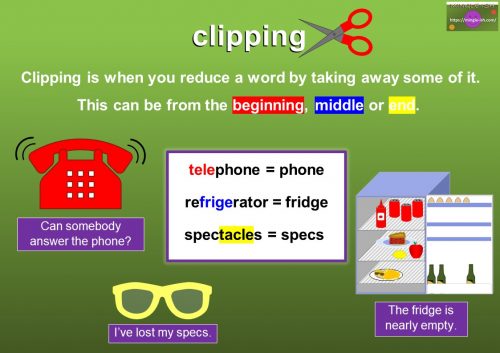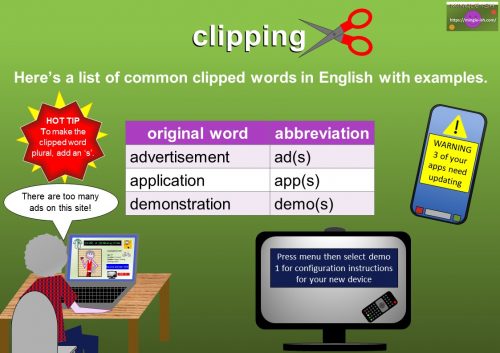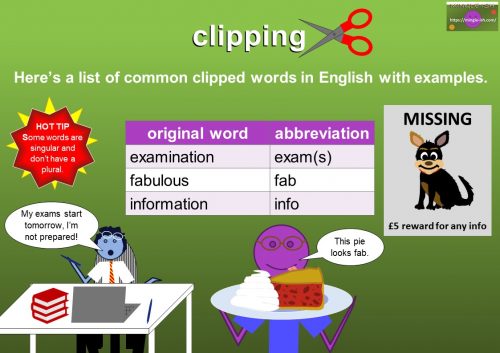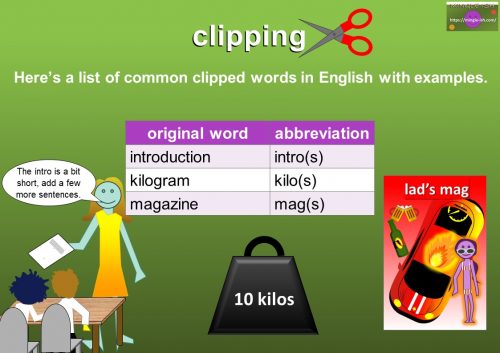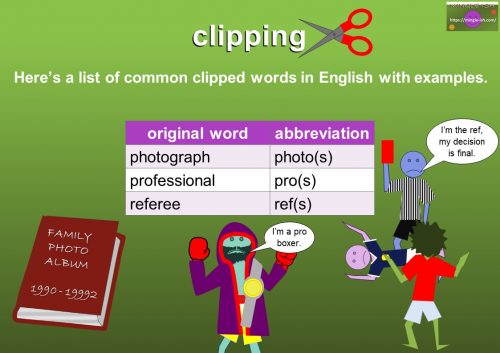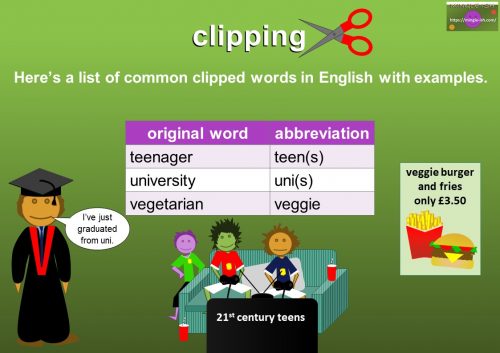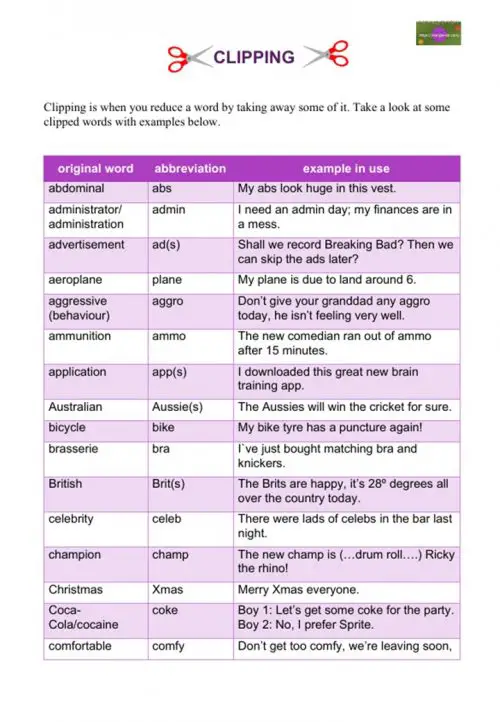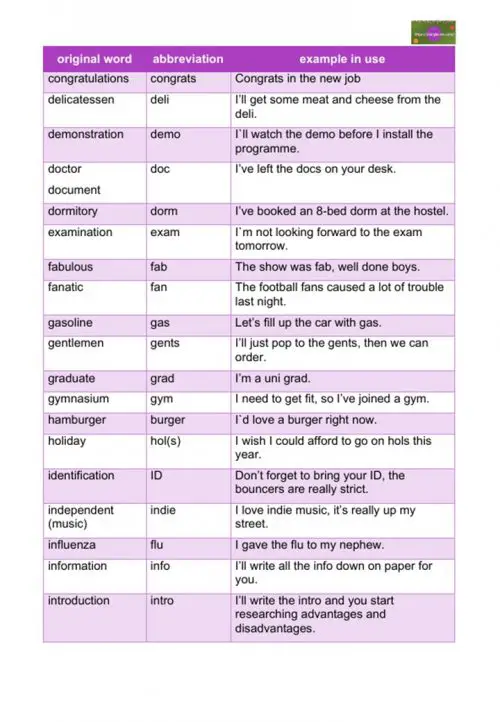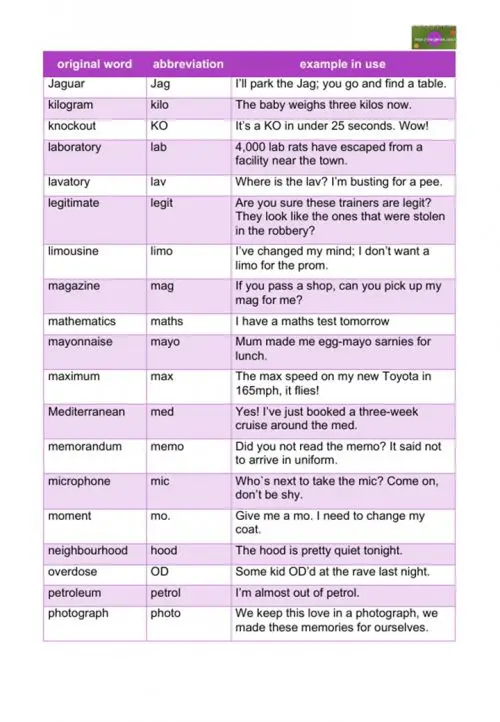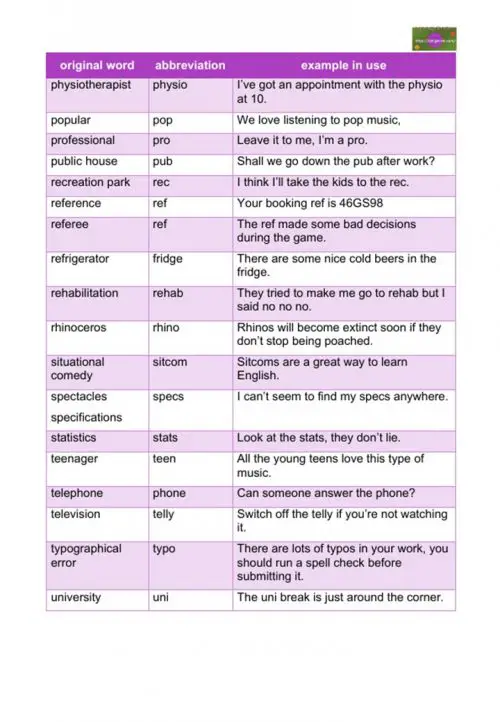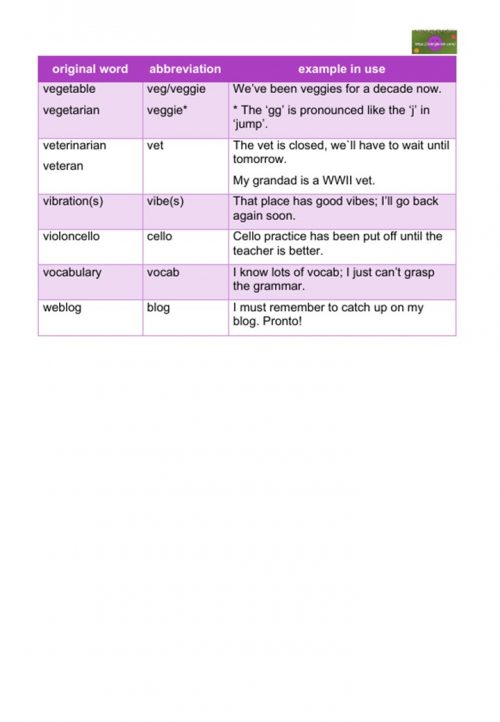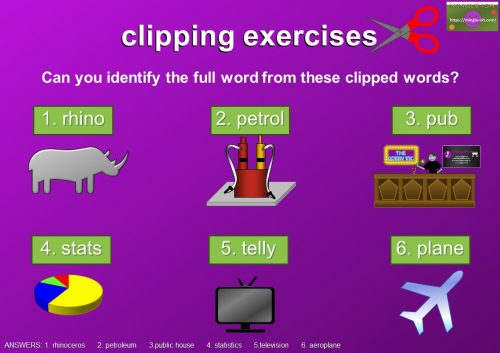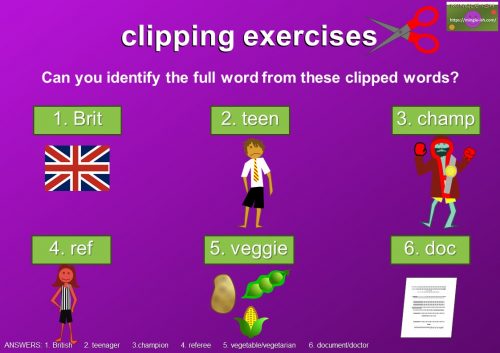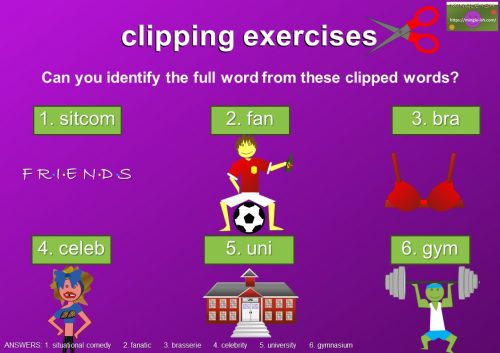Three types of clipped words with 60+ examples
What are Clipped Words?
In English language, clipping is the process of forming new
words by dropping one or more syllables from a larger word, thereby
resulting in a shorter word. Clipped Words are the words that are
formed by clipping one or more syllables from a larger word or phrase, while
retaining the meaning of the original word or phrase.
Being shorter, clipped words are easy to spell and pronounce. Clipped words
are more commonly used in everyday language. It is interesting to note, in
some cases, the clipped form of a word is more popular (and more frequently
used) than the original word itself.
Clipping is also known as shortening or truncation. Clipping
refers to part of a word that provides for the whole, such as the word
«bike» from «motorbike», and «cooker» from «pressure cooker».
There are three types of clipped words:
-
Front clipped words: Such words are formed by clipping front part
of a larger word or phrase. In front clipping, the end of the word is
retained. -
Back clipped words: Such words are formed by clipping back part
of a larger word or phrase. In back clipping, the beginning of the word
is retained. -
Middle clipped words: Such words are formed by clipping both
front and back parts of a larger word or phrase. In middle clipping, the
middle of the word is retained.
The image below shows the three types of clipped words with one example of
each type:

Before we take look at some of the examples of Clipped Words, I should note
that sometimes two words are joined together or blended to form a new word.
This process of
blending words
together results in the formation of completely new words called «blend words«. We encourage you to read more about blend words in our article decicated
to the topic.
Front clipping
| Clipped Word | Original word |
|---|---|
| phone | telephone |
| bike | motorbike |
| burger | hamburger |
| cooker | pressure cooker |
| pen | fountain pen |
| plane | aeroplane |
| bus | omnibus |
| tie | neck-tie |
| van | caravan |
| pike | turnpike |
| mum | chrysanthemum |
Back clipping
The image below shows a few common examples of back-clipped words:
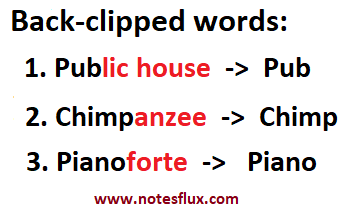
| Clipped Word | Original word |
|---|---|
| gym | gymnasium |
| cable | cablegram |
| pub | public house |
| exam | examination |
| specs | spectacles |
| veg | vegetarian |
| memo | memorandum |
| gas | gasoline |
| photo | photograph |
| cafe | cafeteria |
| lab | laboratory |
| ad | advertisement |
| lunch | luncheon |
| fan | fanatic |
| cab | cabriolet |
| zoo | zoological garden |
| sitcom | situation comedy |
| piano | pianoforte |
| pants | pantaloons |
| movie | moving picture |
| ag | agriculture |
| alum | alumna |
| bio | biology |
| auto | auto-mobile |
| disco | discotheque |
| chimp | chimpanzee |
| dad | daddy |
| fab | fabulous |
| mom | mommy |
| prep | preparatory |
| quad | quadrangle |
| frank | frankfurter |
| pug | pugnacious |
| math | mathematics |
| grad | graduate |
| limo | limousine |
| dorm | dormitory |
| sub | submarine |
| taxi | taxicab |
| teen | teenager |
| tux | tuxedo |
| typo | typographical error |
| co-op | cooperative |
| rhino | rhinoceros |
| stereo | stereophonics |
| stats | statistics |
| rev | revolution |
| cuke | cucumber |
| con | convict |
| store | storehouse |
| ref | referee |
| non-veg | non-vegetarian |
| vet | veterinary surgeon |
| sis | sister |
| vibes | vibrations |
| ID | identification |
Middle clipping
| Clipped Word | Original word |
|---|---|
| fridge | refrigerator |
| flu | influenza |
| script (for medicine) | Prescription |
Note: Clipped words are different from abbreviations and
contractions. Although, an abbreviation is also a shortened
form of a word or phrase, they often end with a period (.), such as Lib. for Library.
Abbreviations are clearly understood to be substitutes for the full term. On
the other hand, a contraction is a word or phrase that has been
shortened by dropping one or more letters. When writing a contraction, an
apostrophe (‘) replaces the missing
letters, such as let‘s go for
let us go.
Please also take a look at some of our trending online practice tests:
- Practice subject-verb agreement
- Transitive and Intransitive verbs
- Identifying Gerunds and participles
- practice test on blend words
- A Level Organic Chemistry introduction
- A Level Organic Chemistry Halogenoalkanes
Thanks for reading this article. We sincerely hope you enjoyed it.
If you noticed any mistake, or have suggestions for us, please let us know
in the comments below. Thanks again.
Copyright © 2016-2021, www.notesflux.com
See Also:
English Grammar:
- 10 useful IELTS preparation tips
- 6 useful online resources for IELTS preparation:
- Gerunds, participles and infinitives
- What are simile and metaphor?
- Clauses and their types
- Finite and non-finite verbs
- what are imperative sentences?
- Transitive and intransitive verbs
- Direct and indirect objects
Physics:
- Changes in Energy Stores
- Work, Power and Efficiency
- Electric Current and Circuits
- Static Electricity
Biology:
- Cell Structure
- Cell Division
- Transport in Cells
- Bacteria, Viruses, Pathogens and Communicable Diseases
- Monoclonal antibodies
- Plant-disease
Language changes and evolves both subtly and quite obviously; one of the more obvious ways is through clipping, where shorter words are cut out of longer words.
Believe me, you don’t become a language translation professional by chance. While some students and young adults might drift into a field through inertia or because of a family legacy – or simply having no idea what to do with their lives and needing a job – those of us in translation services are here because of one primary reason: We have a love for language. From a young age we were fascinated by the way people could communicate just by making different noises with their mouths and throats, and how the same noises, arranged in different ways, formed wholly different languages.
That also means we’re all familiar with the basic ideas of language studies, whether we’re experts in the field or just interested amateurs who use our off-hours to read about language and how it’s formed. This means we’re all either the best person to wind up sitting next to at a dinner party, or the worst, depending on your own interests. Recently, for example, I’ve been reading about the fascinating process of Clipping in language evolution.
The Clipped Word
What is “clipping”? It’s actually something you’re likely very familiar with. It’s the simple process of forming a new word by clipping off part of an existing word. An easy example is the word exam, which of course comes from the longer word examination. The letters “ination” have simply been clipped off, forming a new word that shares the definition and context of the older word.
Clipping is, of course, a reductive process that shortens words and thus shortens the effort involved in speech and writing, albeit by a tiny increment. However, you can imagine how this process can slowly reduce the time spent expressing thoughts, paring language down to shorter and shorter words. Anyone who has read Shakespeare might see how language has sped up and become much faster and more clipped over the centuries.
Clipping also reduces formality. Examination is a word that would be used by a teacher or in official language on a school’s policy page, while exam is the word all the students would use.
Types of Clipping
- Clipping comes in four basic varieties:
- Back Clipping: As we’ve seen in exam and examination, back clipping is when the back half of a word is deleted. Another example is memo, the back-clipped form of memorandum.
- Fore Clipping: The process can be reversed, deleting the beginning of a word, as in varsity, which is a fore-clipped (and slightly mutated) version of university.
- Mid Clipping: More rare is when the beginning and end of a word is clipped to form a new word. A good example is flu, clipped out of influenza.
- Compound Clipping: Much rarer, this involves clipping more than one word to form a new word. The best example I can think of is cablegram, taken from the phrase cable telegram.
If you found this fascinating, you might have a future as a translator!
Learn more about our professional document translation services.

Liraz Postan
Liraz is an International SEO and Content Expert with over 13 years of experience.
What our customers are saying
In contradiction to the
eighteenth century British English purism, the American English of
the nineteenth century reveled in the process of clipping. Clipping
is a process of word formation which shortens a polysyllabic word by
deleting one or more syllables, thus retaining only a part of the
stem, e.g., lab
(laboratory), bra
(brassiиre), bus
(omnibus), car
(motorcar), and mob
(mobile vulgus). Clipping is synonymous to shortening, so these terms
will be used interchangeably.
Various classifications of
shortened words have been offered. The generally accepted one is that
based on the position of the clipped part. According to whether it
is the final, the initial, or the middle part of the word that is cut
off we distinguish initial clipping (aphaeresis),
and medial clipping (syncope),
final clipping (apocope).
-
Aphaeresis:
the loss of one or more
letters at the beginning of a word:
story
(history), cello
(violoncello), phone
(telephone). -
Syncope:
the loss of one or more
letters in the interior of a word:
specs
(spectacles), aphesis
(aphaeresis). -
Apocope:
the loss of one or more
letters at the end of a word:
ad (advertisement), ed
(editor), fab
(fabulous), prof
(professor), and gym
(gymnastics or gymnasium).
In some cases, speakers do not
even realize that a particular word is the product of clipping; for
example, the word zoo
was formed from
zoological garden.
4.9 Acronyms and Abbreviations
Acronyms are formed by taking the
initial letters of some or all the words in a phrase or title and
pronouncing them as a word. This type of word formation is prevalent
in names of organizations, military, and scientific terminology.
Common examples are American
Psychological Association (APA),
Modern Language
Association (MLA),
Federal Emergency Management Agency (FEMA), United Nations
International Children’s Emergency Fund (UNICEF), Antisocial
Behavior Order (ASBO), frequently asked questions (FAQ), Scholastic
Achievement (or Aptitude) Test(s) (SAT), Joint Photographic Experts
Group (JPEG), Designer Shoe Warehouse (DSW), Personal Identification
Number (PIN), Hypertext Markup Language (HTML), random access memory
(RAM), very important person (VIP), read only memory (ROM), and
others.
In numerous cases, speakers do
not realize that they are using an acronym. One example is radar
(radio detecting and
ranging), an acronym common throughout many languages. Other examples
of acronyms are scuba
(self-contained underwater breathing apparatus), and laser
(light amplification by stimulated emission of radiation). It is
widely assumed that the use of text shorthand known as acronyms was
started as a result of the use of Morse Code to send and receive
messages in the 19th century. Because telegraph companies charged
the sender by the word, acronyms were invented to save the sender
costs and to quicken the time and effort of the sending agent.
Telegraph companies would not only charge by the word but would
charge additional fees for numerals and words that could not be
easily pronounced. So, acronyms which had no vowels were given
vowels so as to make them pronounceable. A good example of this is
the apparatus used for Radio Ranging and Detection. To send this
collection of words, a sender would be charged for four separate
words. Sending RRD would be only one word but charged an extra fee
because it was not pronounceable. Sending radar gets the sender
charged for only one pronounceable word. Modern society uses
acronyms for many of the same reasons as the telegraph companies,
e.g. ease of typing and speed of communication, be it on the modern
day computer keyboard or the ubiquitous cell phone. Technically there
is a difference between acronyms and abbreviations. This difference
becomes vague in many instances and makes it sometimes difficult to
assign either word to the usage. While N.A.T.O. would be an
abbreviation, it is also an acronym as in NATO. Some scholars
distinguish between acronyms and initialisms; however, we do not
recognize a sharp distinction between acronyms and initialisms,
preferring the former as an inclusive label.
Abbreviation is defined as “a
reduced version of a word, phrase, or sentence”. Abbreviations are
societal slangs. Abbreviations come and go in waves. The reason for
abbreviations is linguistic economy; communicators value succinct
language, and abbreviations contribute to concise style.
Technological constraints contribute to the use of abbreviations.
Abbreviations also help to convey “a sense of social identity; to
use an abbreviated form is to be ‘in the know’—a part of the
social group to which the abbreviation belongs” (Crystal, 2005,
p.120). Those who are computer savvy will be recognized by their
extensive use of abbreviations such as WYSIWYG (What you see is what
you get), and others.
Now abbreviations
are part netspeak and textspeak, which is a rapidly emerging jargon,
used among Internet users. David Crystal compiled a glossary of
netspeak and textspeak, and some examples illustrated here are
borrowed from the Glossary:
bps (bits per second), four-oh-four [404] (a term identifying an
error message shown on screen when a browser makes a faulty request
to a server), and others (Crystal, 2004). There are a lot of
abbreviations used by “species of spoken shorthand” (as cited in
Crystal, 2004, p.120): OK (all correct), PDQ (pretty damn quick), GTT
(gone to Texas), BTW (by the way), ETA (estimated time of arrival),
FYI (for your information), POS (parent over shoulder), ROFL (rolling
on the floor laughing), RSVP (Rйpondez s’il vous plait), BRB (Be
right back), TTYL (Talk to you later), and others.
Соседние файлы в предмете [НЕСОРТИРОВАННОЕ]
- #
- #
- #
- #
- #
- #
- #
- #
- #
- #
- #
Clipping/clipped words (or morphology if you prefer the linguistic term) is a way of creating new words in English by shortening the original word. It’s very trendy to clip words these days, with our fast-paced lives, we need to be able to speak faster, right? I’ll tell you how clipping works if you don’t already know…
A long word is reduced by removing some of the word. This creates a new word (usually one syllable long). This word is then used instead of the original word as an informal/slang term.
I’m pretty certain you’ve come across clipped words before, but maybe you just don’t know it! Look at the slide for some examples of clipped words and their meaning.
clipped words with examples and pictures
Let’s take a look at some common clipped words in action.
List of clipped words
Here is a list of some of the most common clipped words we use in English with examples. A nice little practice exercise for you is to make up some sentences of your own.
- abdominal
abbreviation – abs
example – My abs look huge in this vest. - administrator/administration
abbreviation – admin
example – I need an admin day; my finances are in a mess. - advertisement
abbreviation – ad(s)
example – Shall we record Breaking Bad? Then we can skip the ads later? - aeroplane
abbreviation – plane
example – My plane is due to land around 6. - aggressive (behaviour)
abbreviation – aggro
example – Don’t give your granddad any aggro today, he isn’t feeling very well. - ammunition
abbreviation – ammo
example – The new comedian ran out of ammo after 15 minutes. - application
abbreviation – app(s)
example – I downloaded this great new brain training app. - Australian
abbreviation – Aussie(s)
example – The Aussies will win the cricket for sure. - bicycle
abbreviation – bike
example – My bike tyre has a puncture again! - brasserie
abbreviation – bra
example – I`ve just bought matching bra and knickers. - British
abbreviation – Brit(s)
example – The Brits are happy, it’s 28º degrees all over the country today. - celebrity
abbreviation – celeb
example – There were lads of celebs in the bar last night. - champion
abbreviation – champ
example – The new champ is (…drum roll….) Ricky the rhino! - Christmas
abbreviation – Xmas
example – Merry Xmas everyone. - Coca-Cola/cocaine
abbreviation – coke
example – Boy 1: Let’s get some coke for the party.
Boy 2: No, I prefer Sprite. - comfortable
abbreviation – comfy
example – Don’t get too comfy, we’re leaving soon, - congratulations
abbreviation – congrats
example – Congrats in the new job
- delicatessen
abbreviation – deli
example – I’ll get some meat and cheese from the deli. - demonstration
abbreviation – demo
example – I`ll watch the demo before I install the programme. - doctor/document
abbreviation – doc
example – I’ve left the docs on your desk. - dormitory
abbreviation – dorm
example – I’ve booked an 8-bed dorm at the hostel. - examination
abbreviation – exam
example – I`m not looking forward to the exam tomorrow. - fabulous
abbreviation – fab
example – The show was fab, well done boys. - fanatic
abbreviation – fan
example – The football fans caused a lot of trouble last night. - gasoline
abbreviation – gas
example – Let’s fill up the car with gas. - gentlemen
abbreviation – gents
example – I’ll just pop to the gents, then we can order. - graduate
abbreviation – grad
example – I’m a uni grad. - gymnasium
abbreviation – gym
example – I need to get fit, so I’ve joined a gym. - hamburger
abbreviation – burger
example – I`d love a burger right now. - holiday
abbreviation – hol(s)
example – I wish I could afford to go on hols this year. - identification
abbreviation – ID
example – Don’t forget to bring your ID, the bouncers are really strict. - independent (music)
abbreviation – indie
example – I love indie music, it’s really up my street. - influenza
abbreviation – flu
example – I gave the flu to my nephew. - information
abbreviation – info
example – I’ll write all the info down on paper for you. - introduction
abbreviation – intro
example – I’ll write the intro and you start researching advantages and disadvantages. - Jaguar
abbreviation – Jag
example – I’ll park the Jag; you go and find a table. - kilogram
abbreviation – kilo
example – The baby weighs three kilos now. - knockout
abbreviation – KO
example – It’s a KO in under 25 seconds. Wow! - laboratory
abbreviation – lab
example – 4,000 lab rats have escaped from a facility near the town. - lavatory
abbreviation – lav
example – Where is the lav? I’m busting for a pee. - legitimate
abbreviation – legit
example – Are you sure these trainers are legit? They look like the ones that were stolen in the robbery? - limousine
abbreviation – limo
example – I’ve changed my mind; I don’t want a limo for the prom.
- magazine
abbreviation – mag
example – If you pass a shop, can you pick up my mag for me? - mathematics
abbreviation – maths
example – I have a maths test tomorrow - mayonnaise
abbreviation – mayo
example – Mum made me egg-mayo sarnies for lunch. - maximum
abbreviation – max
example – The max speed on my new Toyota in 165mph, it flies! - Mediterranean
abbreviation – med
example – Yes! I’ve just booked a three-week cruise around the med. - memorandum
abbreviation – memo
example – Did you not read the memo? It said not to arrive in uniform. - microphone
abbreviation – mic
example – Who`s next to take the mic? Come on, don’t be shy. - moment
abbreviation – mo.
example – Give me a mo. I need to change my coat. - neighbourhood
abbreviation – hood
example – The hood is pretty quiet tonight. - overdose
abbreviation – OD
example – Some kid OD’d at the rave last night. - petroleum
abbreviation – petrol
example – I’m almost out of petrol. - photograph
abbreviation – photo
example – We keep this love in a photograph, we made these memories for ourselves. - physiotherapist
abbreviation – physio
example – I’ve got an appointment with the physio at 10. - popular
abbreviation – pop
example – We love listening to pop music, - professional
abbreviation – pro
example – Leave it to me, I’m a pro. - public house
abbreviation – pub
example – Shall we go down the pub after work?
- recreation park
abbreviation – rec
example – I think I’ll take the kids to the rec. - reference
abbreviation – ref
example – Your booking ref is 46GS98 - referee
abbreviation – ref
example – The ref made some bad decisions during the game. - refrigerator
abbreviation – fridge
example – There are some nice cold beers in the fridge. - rehabilitation
abbreviation – rehab
example – They tried to make me go to rehab but I said no no no. - rhinoceros rhino
abbreviation – Rhinos
example – will become extinct soon if they don’t stop being poached. - situational comedy
abbreviation – sitcom
example – Sitcoms are a great way to learn English. - spectacles/specifications
abbreviation – specs
example – I can’t seem to find my specs anywhere. - statistics
abbreviation – stats
example – Look at the stats, they don’t lie. - teenager
abbreviation – teen
example – All the young teens love this type of music. - telephone
abbreviation – phone
example – Can someone answer the phone? - television
abbreviation – telly
example – Switch off the telly if you’re not watching it. - typographical error
abbreviation – typo
example – There are lots of typos in your work, you should run a spell check before submitting it. - university
abbreviation – uni
example – The uni break is just around the corner. - vegetable/vegetarian
abbreviation – veg/veggie
example – veggie* We’ve been veggies for a decade now.
* The ‘gg’ is pronounced like the ‘j’ in ‘jump’. - veterinarian/veteran
abbreviation – vet
example – The vet is closed, we`ll have to wait until tomorrow.
example – My grandad is a WWII vet. - vibration(s)
abbreviation – vibe(s)
example – That place has good vibes; I’ll go back again soon. - violoncello
abbreviation – cello
example – Cello practice has been put off until the teacher is better. - vocabulary
abbreviation – vocab
example – I know lots of vocab; I just can’t grasp the grammar. - weblog
abbreviation – blog
example – I must remember to catch up on my blog. Pronto!
Here’s the table for you to download and study at your leisure.
Can you think of any other clipped words? If you have, let me know in the comments below.
clipping exercises
Test yourself and see what you’ve learnt with these clipped word exercises.
Have you ever wondered how new words are created in English? Today you will be learning about one way of doing that!
This topic is about neologism, which refers to the coining of a new word. Lots of neologisms are commonly used and recognised in the English language. Today, we will be focusing on clipping. We will explain what clipping means, and give some examples. We will also look at why we clip words and the differences between clipping and abbreviations. As you read through the following article, consider how many clipped words you already know!

Before we dive in, let’s begin by looking at how new words are made.
What are different types of neologisms?
There are lots of different ways to create new words. Here are some of them:
-
Derivation — adding prefixes or suffixes to existing words.
-
Back-formation — the opposite of derivation; removing a prefix or suffix from an existing word.
-
Compounding — two existing words that are either hyphenated or formed into one word.
-
Repurposing — taking a word from one context and putting it into another.
-
Conversion — taking a word that is in a particular word class and using it as another word class.
-
Eponyms — words that are named after places or people.
-
Loanwords — words that are borrowed from other languages.
-
Onomatopoeia — words that are created by imitating a sound.
-
Reduplication — words or sounds in words that are repeated (either fully or partially).
-
Occasionalism — words that are invented for a particular occasion for which there is no existing word.
-
Error — words that are created as a result of misspellings or mispronunciations.
-
Blends — taking parts of two different words and putting them together to form a single word.
-
Abbreviations — shortening longer words.
And finally, the focus of this article: Clipping (also known as truncation).
What is clipping?
In the English language, clipping refers to shortening an existing word. This is done by removing part of a longer word, usually by cutting it down to a single syllable, to make a new word.
Imagine a hairdresser takes clippers to a person’s hair and cuts some off to shorten it. Clipping is like that, just with words!

It is important to note that, unlike some other ways of forming new words, clipping a word does not change its meaning.
What are the different types of clipping?
There are two main types of clipping. These are:
Initial clipping (also known as apheresis) which refers to removing the first syllable(s) to create a clipped word.
Final clipping (also known as apocope) which refers to removing the last syllable(s) to create a clipped word.
What are some examples of clipping?
Below are some examples of clipped words, along with the words they came from:
|
Existing word |
Clipped word |
Type of clipping |
|
Telephone |
Phone |
Initial |
|
Mathematics |
Maths |
Final |
|
Photograph |
Photo |
Final |
|
Aeroplane |
Plane |
Initial |
|
University |
Uni |
Final |
| Robot | Bot | Initial |
Clipping can also be done with names, for example:
|
Long form |
Short form |
|
Elizabeth |
Liz |
|
Robert |
Rob |
|
Charlotte |
Charlie |
|
Isabella |
Bella |
|
Christopher |
Chris |
Why do we clip words?
We clip words for a variety of reasons, some of which are discussed below:
Change formality of spoken language
Most clipped words are more informal than the longer existing words, so they are often used in more casual conversations, usually among familiar people. For example:
In a conversation between siblings, they may refer to each other as ‘bro’ or ‘sis’, which are the clipped versions of ‘brother’ and ‘sister’. However, if they were to introduce each other to someone unfamiliar, they would probably say, ‘This is my brother/sister.’
Change formality of written language
As well as being used in informal speech, they are also used in informal writing. For example:
You could text a friend, ‘I just finished my English exam.’ This would be more casual than ‘I just finished my English examination.’ The word ‘examination’ would usually be reserved for more formal writing, such as official documents in institutions.
Simplicity and efficiency
This may be quite a simple reason, but it is true! Clipped words are easier to pronounce and quicker to say, leading to more efficient conversations that are easier to understand and convey a point faster. They are also easier to spell and faster to write, leading to faster-written communication and responses.
How does clipping differ from abbreviations?
Although both clipping and abbreviations create words that are shorter than the original words, there are a couple of differences between them. Let’s begin by exploring the definition of abbreviation:
Abbreviation
The abbreviation refers to the shortening of the length of a word. For example, Doctor can be shortened to Dr., and Junior can be shortened to Jr. These shortened words are mainly used in written language, and not spoken language. For example, when writing ‘Dr.’ or ‘Jr.’, you would still pronounce them as ‘Doctor’ and ‘Junior’ in speech. Some abbreviations end with full stops, but they are not always needed.
There are also other types of abbreviations, such as:
-
Acronyms — The initial letters of different words or phrases are taken to form a word that is pronounced as a single unit; e.g. UNICEF (United Nations International Children’s Emergency Fund) or PIN (Personal Identification Number).
-
Initialisms — The initial letters of different words or phrases are taken to form initials that are pronounced individually; e.g. IPA (International Phonetic Alphabet) or USB (Universal Serial Bus).
-
Contractions — Some letters or sounds are omitted from words, usually shown with an apostrophe; e.g. cannot → can’t, have not → haven’t.
On the other hand, clipping is the removal of part of an existing word to create a new, shorter word with the same meaning. It is used in both written and spoken language; the written form does not differ from the spoken form.
Can you think of any examples of clipping that have not been previously mentioned?
Clipping — Key takeaways
- Clipping refers to the shortening of an existing word. This is done by removing part of a longer word and creating a new word, usually a single syllable.
- Clipping does not change the meaning of the word.
- There are two types of clipping: final clipping (apocope) and initial clipping (apheresis).
- Clipping is used in both written and spoken language. This is different from abbreviations, which are used mostly in writing.
- We use clipped words to change the formality of spoken and written language and for simpler and more efficient communication.


